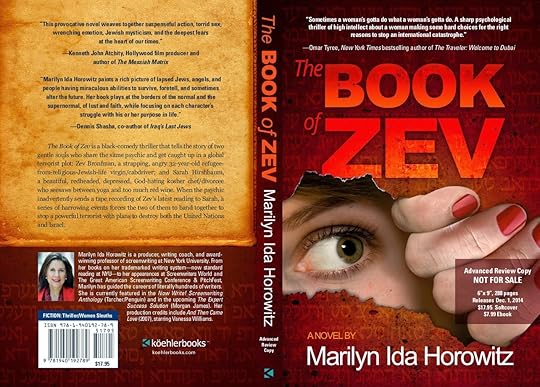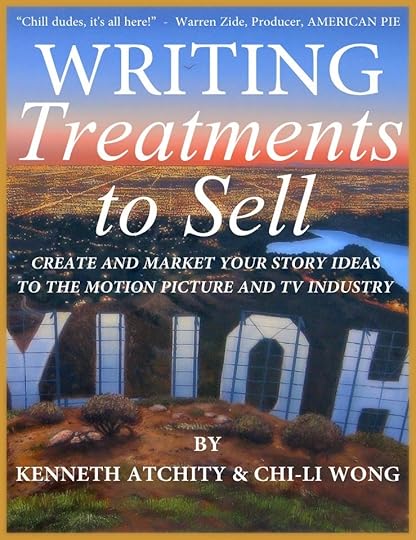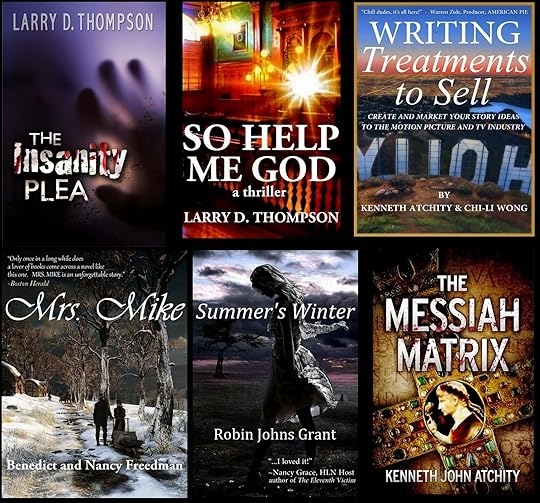Kenneth Atchity's Blog, page 182
July 18, 2014
Check out Marilyn Horowitz's The Book of Zev

The Book of Zev is a black-comedy thriller that tells the story of two gentle people who change the course of history. Zev Bronfman, a strapping 32-year old-virgin, angry atheist, refugee from a religious Jewish life, and former engineer for the U.S. Patent Office in Alexandria, Virginia, drives a cab and sleeps around in New York City. After a bitter divorce, Sarah Hirshbaum, a beautiful, redheaded, depressed, God-hating kosher chef, seesaws between yoga and too much red wine. Independently, the two consult the same psychic who inadvertently sends Sarah Zev’s session tape. When Sarah contacts Zev to pick up the cassette, he discovers that she has been recruited by the Mossad to play Mata Hari with the current president of Iran, Mahmoud Zarafshan, who believes he is the 12th Imam, and must instigate Armageddon in order to facilitate the Second Coming. It is up to Sarah and Zev to thwart his plans.


Published on July 18, 2014 00:00
July 17, 2014
Story Merchant Books June Bestsellers
Published on July 17, 2014 00:00
July 16, 2014
Publisher's Weekly Featurs Dennis Palumbo's Phantom Limb

Phantom Limb: A Daniel Rinaldi MysteryDennis Palumbo. Poisoned Pen, $24.95 (336p) ISBN 978-1-4642-0256-8
 At the start of Palumbo’s twisty fourth Daniel Rinaldi mystery (after 2013’s Night Terrors), the psychologist, who consults for the Pittsburgh PD, receives a visitor one afternoon he last saw posing in Playboy almost 30 years earlier. Lisa Campbell, ex-starlet and current trophy wife to elderly, wheelchair-bound tycoon Charles Harland, plans to kill herself at 7 o’clock that evening. Daniel has only 50 minutes to talk her out of it. Soon after Lisa leaves his office, the police inform him that she’s been kidnapped. As a doctor who may have heard critical information that he’s ethically bound by confidentiality not to share, Daniel is in tricky position as he seeks to help the Harland family and the police get Lisa back. He serves as the perfect point of view character, central to the action without needing to clamor for attention. Daniel’s personal story continues to evolve in this satisfying entry, which ends on a cliffhanger. (Sept.)
At the start of Palumbo’s twisty fourth Daniel Rinaldi mystery (after 2013’s Night Terrors), the psychologist, who consults for the Pittsburgh PD, receives a visitor one afternoon he last saw posing in Playboy almost 30 years earlier. Lisa Campbell, ex-starlet and current trophy wife to elderly, wheelchair-bound tycoon Charles Harland, plans to kill herself at 7 o’clock that evening. Daniel has only 50 minutes to talk her out of it. Soon after Lisa leaves his office, the police inform him that she’s been kidnapped. As a doctor who may have heard critical information that he’s ethically bound by confidentiality not to share, Daniel is in tricky position as he seeks to help the Harland family and the police get Lisa back. He serves as the perfect point of view character, central to the action without needing to clamor for attention. Daniel’s personal story continues to evolve in this satisfying entry, which ends on a cliffhanger. (Sept.) Reposted from Publishers Weekly

Published on July 16, 2014 00:00
July 15, 2014
Amazon: Friendly giant or unstoppable bully?

Not since the Vietnam War, according to the New York Times, has America’s cultural machinery been so divided.
“There’s enough ruthless intrigue in this profile of the machine also known as Amazon,” writes the widely followed Twitter pundit who posts as Kontra, “to make a TV mini-series.”
Indeed, David Streitfeld’s article on the front page of the New York Times’ Sunday Business section — Feed the Beast (or Else) – is a must-read for anyone who has been following the ongoing clash between Amazon AMZN 2.63% and the lumbering giants in the first retail business Amazon entered: books.
Streitfeld’s story opens with a mystery writer who a few years ago was reduced to returning bottles and cans for grocery money and now pulls in six figures a year from pot-boilers published, promoted and awarded prizes by Thomas & Mercer, one of Amazon’s many book imprints.
Toward the end of the piece Streitfeld tells the story of Berkshire Publishing, a small academic house in Great Barrington, Mass., that is dependent on Amazon for 15% of its sales. “I offered them a 30% discount,” says Berkshire’s Karen Christensen, “and they demanded 40.”
Amazon got what it wanted, the Times reports. Then it asked for 45%.
According to Streitfeld, the very public dispute with Hachette that came to light when Amazon stopped carrying the publisher’s titles was triggered by an even more aggressive demand. “The general belief,” Streitfeld writes, “is that [Amazon] wants to increase its share of revenue on every e-book to 50% from 30%.”
Apple is currently appealing a judge’s ruling that it violated U.S. antitrust laws when it conspired with publishers to switch from a business model where Amazon set the prices of e-books to one where publishers set the prices and gave Apple a 30% cut.
Follow Philip Elmer-DeWitt on Twitter at @philiped.
Reposted from Fortune

Published on July 15, 2014 00:00
Bestseller's World Reviews Nicole Sallak Anderson's eHuman Dawn
 Reviewed by Timea Barabas
Reviewed by Timea BarabaseHuman Dawn is a book about humanity. It presents us with a likely scenario of evolution and it poses many dilemmas regarding our present and future. Rapped in the mist of utopia, this futuristic world soon reveals itself to be a dystopia. Following in the footsteps of George Orwell’s 1984 and Aldous Huxley’s A Brave New World, eHuman Dawn presents another form of totalitarian government.
There are many levels to the book itself. First, there is the intimate plane of interpersonal relationships, where we close-in on individuals and their personal experiences. Second is the social and political plane, which presents the totalitarian form of government, the Resistance and their battle for humanity. Lastly, the plane of an entire species.
Nicole Sallak Anderson’s background in computer science lights up her futuristic world. The reality she thought out is skillfully constructed and presented in great detail. It is a world where technology and biology are intertwined and the delimitation between human and machine are blurry. Humanity is presented at the next stage of evolution and on the verge of entering the following stage. So, our species is presented under three forms.
Humanity went through a great leap in evolution, called the Great Shift, when scientists discovered that they can store a human’s life essence into an artificially manufactured body that does not age. This Shift is caused by the many dangerous that threaten the survival of the human race. The problems of disease, famine, and over-population are solved by immortality. Each person is granted the gift of eternal life in artificial bodies, which do not get sick, do not require food but cannot reproduce. There is even an alternative, a way to restart a life. People can opt to jump into a new body and start a fresh life all over again. However, in the process they lose the memory of their previous life. So, if a person is unhappy all he has to do is Jump and restart. There is a constant struggle to keep the population ignorant and happy.
This technologically advanced civilization is more fragile than it looks. The eHumans are not even aware of the World Government’s totalitarian rule. Immortality is fueled by electricity, without power there is no eternal life, this dependency makes immortals quite vulnerable. Also, the citizens of this new world are submitted to continuous surveillance and thought control. However there is also an underground Resistance that plans to overthrow the government.
The reader gets the most intimate with Adam Winter, out of all the characters. He is a popular journalist who begins to see through the fog of deception created by the World Government. Also, he is part of the few eHumans who never Jumped. He sees jumping as the equivalent of death, and he argues that true immortality lies in the memory. So, he chooses to remember and stay immortal. Pushed by curiosity and the threat of possible annihilation he becomes involved with the Resistance and ends up playing an important role in the future of eHumanity. However the key to eHumanity’s future is in Adam’s past. So, only by discovering his identity before the Great Shift can he truly discover his purpose in this eternal life.
Nicole Sallak Anderson’s eHuman Dawn is well thought out and well written. I would recommend this book to anyone who enjoys dystopias and sci-fi. There is a lot of action, but there is plenty of romance too, and above all philosophical reflections about control, privacy, totalitarian systems, the nature of man and immortality.
Reposted from Bestseller's World

Published on July 15, 2014 00:00
July 11, 2014
How to Prepare For Your Digital Afterlife

If you’re browsing the internet for information and entertainment, chances are you’ve got online accounts and a host of pesky passwords to remember. With the advent of Facebook, Twitter, Flickr, Tumblr, Yahoo, Myspace and hundreds of other social media networks and forums, our identities no longer reside solely on our person. They are completely intertwined with the mass media in all its formats. Add legal and financial information on banking and government websites, and you’ve got quite a knot to untangle. Just as it’s important to write up a will, it’s essential to prepare for your digital afterlife.
In the olden days, when a person passed away, it was relatively simple to clear up their affairs. Bank accounts were closed by relatives, possessions and assets given out, and death notices prepared. Now, an individual actually continues to live on after death, in the form of their networks and online accounts. There is a good chance that someone may write you an email or drop a line on your Facebook page, even once you’re gone. In 1900, a person’s sphere of acquaintance might extend to 50 or 100 others over their lifetime. Now, we meet and make connections with hundreds or thousands of people, both virtually and in person. It took you time and effort to create that web, so it takes the same to unravel it.
You can help the process along. Start by collecting all of your online account usernames and passwords. Store them in a safe place, even a deposit box at the bank. Give the key (or the list itself) to someone you trust completely, with the instructions that it is only to be viewed upon your death. Along with the list, you can include special requests for different online accounts. Some people prefer their Facebook account to be de-listed, while others are fine with it becoming an online memorial. You can also specify which files and photo directories you would like deleted forever.
Luckily, along with the technical complications of the internet, there are a host of technical solutions. Your informational archives can be downloaded into a single file to be kept on your hard drive, which offers a wonderful record of your life for your loved ones after you pass on. Archiving services are available which support Facebook, Twitter, Instagram, Foursquare and many other platforms.
New companies are springing up to deal specifically with the issue of the digital afterlife. Password management services such as LastPass collect all of your online profile information and keep it encrypted until it’s unlocked with one special password. You can give a trusted family member the key, to be opened only in the event of your death.
Your online identity should be viewed as a sort of legacy that you pass on, just like your financial estate. So choose someone to administer your affairs upon your death, if possible. If you prepare for your digital afterlife, you’ll have the comfort of knowing that when you go, your information won’t be left floating in cyberspace. In fact, your digital afterlife may provide connection and sustenance to those who miss you most.
Reposted from Life After Death

Published on July 11, 2014 21:21
July 10, 2014
Jane Tara's Forecast #1 on Kobo!
Published on July 10, 2014 00:00
July 8, 2014
Guest Post: Why I Love Negative Reviews by Rainy Kaye
 We all strive for excellence in our work. Sometimes, though, others don't think we measure up. It can be annoying, heartbreaking, or downright infuriating. Others will remind us that not everything is everyone's cup of steeped leaf water, and we'll eventually put down the chocolate, or wine, and get on with our existence.
We all strive for excellence in our work. Sometimes, though, others don't think we measure up. It can be annoying, heartbreaking, or downright infuriating. Others will remind us that not everything is everyone's cup of steeped leaf water, and we'll eventually put down the chocolate, or wine, and get on with our existence. But could it be we actually need negative reviews? Yes!
Here are five reasons why:
Congratulations! You're real. In the throes of self publishing and sock puppet reviews, it's important to establish a piece of work—and the creator behind it—is honest. One of the surest ways to do this is by receiving negative reviews. Since nothing is universally loved, not even Harry Potter, then a book with only five-star reviews is bound to raise a few eyebrows.
Marketing: You're doing it right. When a book is first born, it usually finds itself passed around from one loving supporter to another. And that's okay. Eventually, though, your baby will have to find its legs and start exploring the world. That means it will be outside the safety of the village, and into the wild. And some things out there will want to have it for breakfast. In short, if your book hasn't garnered a few negative reviews, you haven't sent it out far enough.
Welcome to the classroom. Before publication, a book should have been revised, beta read, and edited. Even with all that, your manuscript likely only saw less than a dozen people. Once out in the world, it—hopefully—will reach hundreds, or even thousands of readers. Among all the voices, some might ring true with thoughts and opinions no one had considered before. Don't dismiss constructive criticism just because it was accompanied by a one-star.
In the words of Picard. Anyone with even the slightest bit of knowledge about a marketing will tell you that word of mouth is the best way to promote anything. This means you need people to talk about the book. Negative reviews often generate conversation among readers. No need to get involved. Just let it run its course. Engaged readers pique curiosity along the way.
It's good for the soul. Praise is nice. If you managed to see a book through from start to finish, you've earned all the bubbly feedback. But even Shakespeare had critics (and now entire classrooms pick his work apart). Sometimes it takes a negative review or two to keep us grounded and, therefore, real to our fans.
No one likes negative reviews. It's okay to be privately hurt or even angry about them. Rant to a friend, take it out on the punching bag, or indulge in a whole gallon of ice cream (not the fat free kind, either). Just keep in mind that in the end, you need negative reviews. They're part of being a real writer.
About the Author:
Rainy Kaye is an aspiring overlord. In the mean time, she blogs at Rainy of The Dark, and and writes paranormal novels from her lair somewhere in Phoenix, Arizona.
When not plotting world domination, she enjoys getting lost around the globe, studying music so she can sing along with symphonic metal bands, and becoming distracted by Twitter.
She is represented by Rossano Trentin of TZLA.
Originally posted on Book Daily

Published on July 08, 2014 20:22
July 4, 2014
Harriet Klausner Gives Nicole Sallak Anderson's eHuman Dawn 5-Star Review

5.0 out of 5 stars
Deep Allegorical Science Fiction Morality Tale
By 2242, mankind conquered life and death due to the great Neuro global network in which humans reside as part of a complex network. However, increase Global Resistance activity leads World Leader Rosario Donahi, with support from Guardian Enterprises and more important from her boss “King” Edgar Prince, to begin a campaign to silence the opposition by using the Energy Grid against them.
For two centuries since the Great Shift, Newsreel host Adam Winter, like all humanity, has lived as an eHuman. For the past five decades he lived with Miranda Valentine in New Omaha, North American Province, but she has left him. Distraught Adam soon learns that the World Government has begun a vicious assault on cities beginning with unplugging Chengdu and New Chelyabinsk with New Omaha on the list for annihilation. He joins the Global Resistance led by first eHuman Dawn and Origen who shock him with their revelations of who he is and what he means to their saving mankind.
With a nod to the Zager And Evans’ In The Year 2525, the allegorical eHuman Dawn looks deeply into what defines a human; what life is and what living means. Although the action starts slow with mass murdering occurring off page, readers will relish this character driven science fiction morality tale; as the good, the bad and the ugly compete with different visions re the future of mankind.
Harriet Klausner

Published on July 04, 2014 00:00
July 2, 2014
Synopsis? Teaser? Timeline?
 Agents and publishers may ask you for a synopsis, or a teaser, or a timeline. What do these terms mean?
Agents and publishers may ask you for a synopsis, or a teaser, or a timeline. What do these terms mean?A “synopsis” is a relatively brief narrative outline of your story, from first to last. It’s a detailed description of the action line and character development, especially for the major characters. The purpose of the synopsis is to provide its reader with an overview of what the story’s all about in enough detail that he or she can be confident that the story makes sense—that all its parts fit together. Note that a synopsis is not a “treatment.” A treatment is a dramatic narration of the story elements to convince the reader of its film or television potential, forcefully emphasizing only highpoints of drama and character; while a synopsis is more matter of fact and thorough. The synopsis of Doug Fetterly’s Breach of Justice sounds like this:
LISHAN AMIR, an Ethiopian born child of a black father and white mother, is an ambitious and dedicated newspaper reporter at the Washington Mirror in D.C. She’s attempting to

expose the corrupt connections between big Food Co. mogul JACK CONNER and top FDA officials. Her bad tempered editor, JERRY, who’s in Conner’s pocket, is doing everything he can to keep her story out of the paper.
Lishan illegally lives in an upscale student housing apartment building thanks to her ex-professor, ERIK, who manages the building and lies about her eligibility. They have a troubled relationship, BFFs with occasional sex that might be more, but she constantly sleeps around and he’s jealous. She’s equally jealous of him, leading to a long cycle of fights and reconciliations in between her investigation activities. They also discuss the crimes of the FDA.

Her search for dirt on the FDA leads her to a book banned by the FBI, whose author, FRAZIER, is in prison for defamation of character against Conner. She reconnects with an old colleague she slept with and dumped, RAFAEL, and sleeps with him again unaware he’s still mad. He steals the hard to find book to spite her…
A “teaser” (aka “sell-sheet”) is a one-page-maximum pitch of your story that leaves the reader longing to read the whole story. Where a synopsis is complete, a teaser is not—a teaser leads the reader to wanting to read the whole manuscript. Here’s how the teaser for “Dark Surf,” a film we’re developing, begins:
Great white sharks are on the attack on beaches around the world, and a surfer falls bloody victim in a Southern California paradise. But, something is suspicious, and beautiful Leilani Marley, a former surfing champion, is now an oceanographer investigating the attacks. She runs into Tristan and the Nomads, night surfers who seem to show up within days of a shark kill. Infatuated by his sheer power and good looks, Leilani begins to fall for Tristan and soon

learns his true identity as the creator and leader of vampire sharks, who are the guardians of the oceans and who perform righteous kills on any who pollute the waters or threaten its species. He has loved her since saving her life off a reef accident twelve years earlier in Hawaii. She bonds with the Nomads to fight the rogue vampire sharks who are killing for blood with a view to dominate the oceans, and possibly the entire world. ..
A “time-line” simply lays out the events of your story by reference to the story’s own clock or to the clock on the wall. In other words, a time-line may reflect the fictional world of a story or the real world surrounding it. Like a synopsis, the time-line contains all the chronological elements from first to last. Here’s an example of the first few lines of a time-line from the film in development, “Andrew Jackson—Battle for New Orleans”:
1814
March, Northern front – Admiral Alexander Cochrane assumes command of the British North American Station based in Halifax.
March 27, Southern front – U. S. force under General Andrew Jackson surrounds and crushes the Creek Indians at their stronghold at Horseshoe bend in Alabama effectively ending the Creek Indian War, and eliminating the Indians as allies to the British army.
April 1, Paris – Napoleon abdicates ending the Continental War freeing British troops for the American War.
May 10, Southern front – British party lands at Pensacola to recruit and supply Creek Indians that had escaped Horseshoe Bend for their upcoming offensive to capture Mobile and New Orleans. Captain Thomas Woodbine in charge and is to report to Admiral Cochrane.
May 28, Southern front – After defeating the Creek Indians Andrew Jackson is commissioned in the regular army to command the 7th Military District, which included Tennessee, Louisiana, and the Mississippi Territory.
June 20, Northern front – Cochrane submits to the Admiralty, his plan for the invasion of United States including a southern campaign to seize New Orleans.
July 8 – In New Orleans, Pierre Lafitte is arrested and jailed for smuggling. Secretary of the Navy, William Jones orders Commodore Patterson to crush the pirates’ operations at Grande Isle and orders the schooner Carolina to New Orleans for that operation.
August 8 – British and American negotiators begin talks in Ghent, Belgium….
I hope these definitions help you understand terms you’ll definitely hear at some point as your career progresses.
Reposted from My Addiction Books by Nadine Maritz

Published on July 02, 2014 00:00







